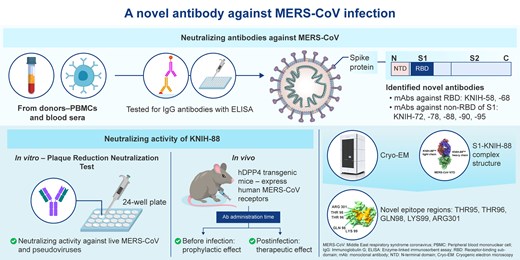-
Views
-
Cite
Cite
So-Young Lee, Hye-Min Woo, Hyunbum Jeon, Nayoung Kim, Da Sol Kim, Chan Ki Park, Hyun-Joo Kim, Kyung-Chang Kim, Joo-Yeon Lee, Kunwoong Park, Youngki Yoo, Kiju Choi, Hansaem Lee, A Novel Antibody Against the Non–Receptor-Binding Domain Region of Middle East Respiratory Syndrome Coronavirus Spike Protein, The Journal of Infectious Diseases, 2025;, jiaf202, https://doi.org/10.1093/infdis/jiaf202
Close - Share Icon Share
Abstract
The Middle East respiratory syndrome coronavirus (MERS-CoV) was first identified in 2012 and has since spread worldwide. To date, no vaccines or therapeutics against MERS-CoV have been approved for clinical use. The spike protein of MERS-CoV facilitates attachment and fusion with target cell membranes. Therefore, inhibiting S protein attachment represents a key therapeutic strategy for treating early MERS-CoV infection. Herein, we present 7 human neutralizing antibodies (KNIH-58, -68, -72, -78, -88, -90, and -95) against MERS-CoV. KNIH-58 and -68 bound to the receptor-binding subdomain (RBD) of the spike protein, while the other 5 monoclonal antibodies did not. KNIH-88, which targets the non-RBD region, exhibited potent neutralizing activities in vitro and in a transgenic mouse model, with similar results for KNIH-58. Structural analysis of KNIH-88 bound to the spike protein revealed novel epitopes in the non-RBD region. These findings may facilitate therapeutic and prophylactic antibody development against MERS-CoV.






